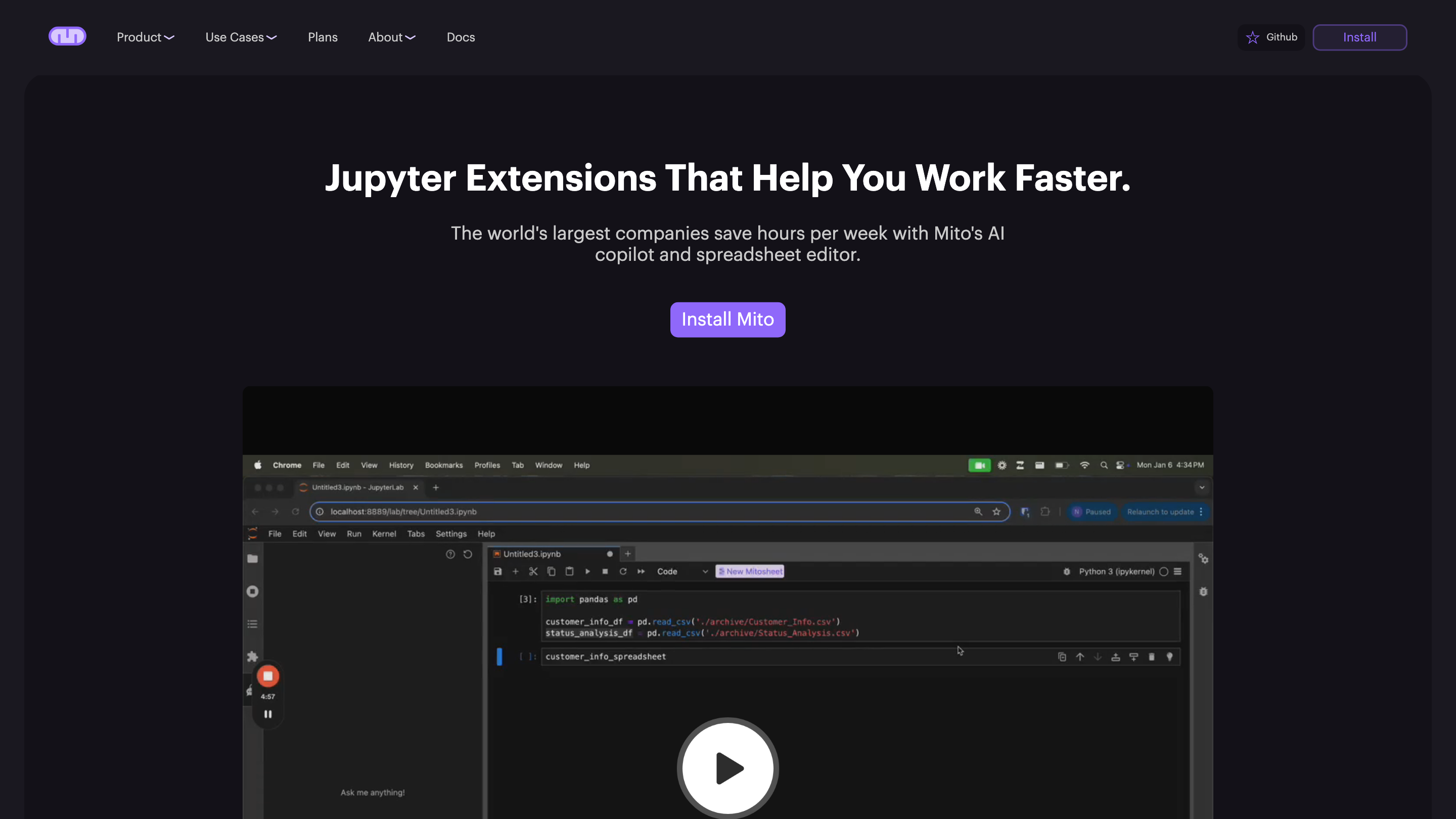Mito
Open siteCoding & Development
Introduction
Mito is a tool that edits spreadsheet data and generates Python code.
Mito Product Information
Mito Spreadsheet is an AI-powered, low-code platform that turns spreadsheets into Python-powered data apps and automation. It provides an in-editor experience where spreadsheet formulas are automatically translated into Python, enabling code completions, smart debugging, and AI-assisted chat directly within Jupyter-like environments. It supports running in Jupyter, Streamlit, and Dash, and aims to help teams accelerate data workflows from Excel-style tasks to interactive dashboards and data apps.
How to Use Mito Spreadsheet
- Install Mito via Python package manager. Example:
pip install mitosheetandpip install mito-ai. - Open in your notebook or app: Use Mito as a Jupyter extension or Streamlit component to start editing spreadsheets.
- Edit and transform: Build formulas (e.g., VLOOKUP, pivots, graphs). Every edit is automatically converted to Python behind the scenes.
- Leverage AI assistance: Use the AI chat to get Python code suggestions, explanations, and fixes within your data workflow.
- Publish dashboards: Share interactive Streamlit or Dash dashboards that reflect the underlying spreadsheet automation.
Note: Mito emphasizes low-code automation, improved reproducibility, and fast iteration for data tasks.
Core Capabilities
- Spreadsheet Editor that converts edits to Python automatically
- 100+ transformations and data manipulations visible as code
- AI Chat integrated into the data workspace for explanations and code suggestions
- Code Completions to finish your thoughts and fix typos without leaving the editor
- Smart Debugging to explain errors and propose fixes with a click
- Easy setup in Jupyter, Streamlit, and Dash without additional infrastructure
- Extensions and environments: JupyterLab, Jupyter Notebooks, JupyterHub, SageMaker, Streamlit, Dash
- Ability to upgrade Python scripts to interactive dashboards (Streamlit/Dash)
- Open-source options and community resources via documentation and Discord/GitHub
How It Works
- You write or edit spreadsheet-like data; Mito translates edits into Python code in the background.
- Use Python-based transformations to build data apps and dashboards without heavy boilerplate.
- AI-assisted features help with code generation, debugging, and understanding complex data tasks.
Use Cases
- Spreadsheet-to-code automation: convert Excel-like tasks into Python workflows
- Lightweight data apps and dashboards for rapid prototyping
- Data quality checks, transformations, and exploratory analysis within a familiar interface
Safety and Legal Considerations
- Ensure proper handling of sensitive data and comply with organizational data governance policies when sharing dashboards or code.
Core Features
- AI-powered spreadsheet-to-Python transformation
- Real-time code completions and smart debugging
- AI Chat integrated into Jupyter environments for guidance
- One-step installation and minimal infrastructure requirements
- Supports Jupyter, Streamlit, and Dash deployments
- Publish and share interactive dashboards from spreadsheet-based workflows
- Open-source options and extensive documentation/community resources
